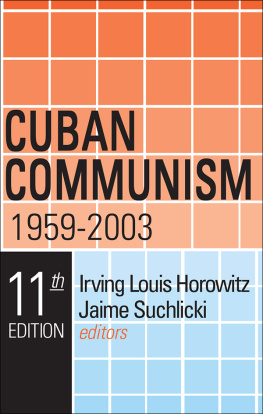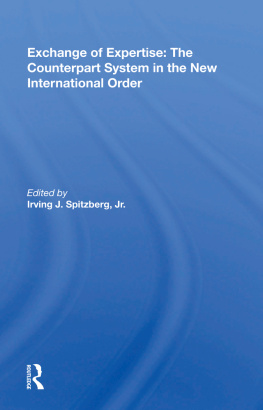Originally published in 1972 by Harper & Row, Publishers.
Published 1997 by Transaction Publishers
Published 2017 by Routledge
2 Park Square, Milton Park, Abingdon, Oxon OX 14 4RN
711 Third Avenue, New York, NY 10017, USA
Routledge is an imprint of the Taylor & Francis Group, an informa business
All rights reserved. No part of this book may be reprinted or reproduced or utilised in any form or by any electronic, mechanical, or other means, now known or hereafter invented, including photocopying and recording, or in any information storage or retrieval system, without permission in writing from the publishers.
Notice:
Product or corporate names may be trademarks or registered trademarks, and are used only for identification and explanation without intent to infringe.
Library of Congress Catalog Number: 96-48069
Library of Congress Cataloging-in-Publication Data
Horowitz, Irving Louis.
Foundations of political sociology / Irving Louis Horowitz ; with a new
introduction by the author.
p. cm.
Originally published: New York : Harper & Row, 1972.
Includes bibliographical references and index.
ISBN 1-56000-912-8 (pbk. : alk. paper)
1. Political sociology. I. Title.
JA76.H67 1997
306.2dc21
96-48069
CIP
Reissuing a work a quarter of a century after its initial publication requires some sort of justification. Usually, this takes an explanatory form of two sorts: claims as to die unique worth of the book in question; or charges that the works produced in the interim do not measure up to the standards set by and in the earlier volume.
Either approach is risky, involving appeals to egotism more than to intellect. Of course, one can always appeal to the demands of the marketplace. In the case of Foundations of Political Sociology, such claims are not entirely without merit, but they tend to beg rather than answer the questions: why this book, and why now? So let me take the bull by its horns, so to speak, and deal with the two kinds of claims described in the opening paragraph.
When Foundations of Political Sociology was first published it met a curious reception. Established sociology journals dealt with it in a less than friendly way. Political science journals were enthusiastic. I found this curious because I had worked so hard to convince the reader that because sociologists have a strong interest in issues of social class and stratification, and how these impact mass participation and voting behavior, they are more likely to deal with political sociology. Political scientists, I indicated, are more likely to be concerned with political socialization, that is, how a citizenry becomes identified with a nation and/or a party through the processes of legitimacy and participation. Further, I made it quite plain that my own preferences were slanted toward the sociological end of the political processthat is, issues related to class, race, ethnicity, and nationalityrather than types of rule and forms of legitimacy.
What then explains this topsy-turvy response? Let me venture a response to an outcome that has long vexed me. The sociological tradition, by the start of the 1970s at least, had become enamored of ideal types and formalization procedures of all sorts. Systems and processeswhether in Weberian or Marxian termshad been extracted from Weber and Marx as such. What remained was less a study of actual systems than a scheme for identifying forms of domination and legitimation. We began to see books on modernity and the state written at such a high level of abstraction that the sense of the empirical was all but lost. As a result, political sociology fell victim to this thirst for formalization. In the process, it was also victimized by general theories so removed from actual processes of domination and legitimation as to lose any commonsensical meaning or relevance to grounded theory.
In the professional world of the early 1970s, sociology was viewed as some sort of a pie, to be divided into slices called economic sociology, political psychology, military sociology, and, of course, the subject of this book, political sociology. While this neat division of labor permitted developing new frameworks of analysis, it did not offer much in the way of synthesis. This process of balkanization, called specialization, within social research has continued well into the 1990s. One major goal of Foundations of Political Sociology was to identify the critical integrative issues that gave flesh and blood to the field. In retrospect it is easy to see why the book was viewed as less than successful by some of my sociological colleagues.
Political scientists, for their part, resonated to the book, despite its being clearly biased toward classical themes in sociology, for a variety of reasons. A large portion of the book was given over the study of actual political systems fascism, socialism, liberalism, conservatismand this emphasis on isms was very much a part of the work study habits of political scientists. From my point of view, I was simply aiming to return to a more sober, common sense of systemsone that took as a starting point the way organization and ideology were integrated into the structure of political domination.
An additional irritant to some sociologists of the time was my avoidance of the emphasisthen quite fashionableof voting behavior as a measure of Left-Center-Right behavior, moving from that point into the study of a thing called political man. What was dubiously gained in this attempt to correlate public opinion with political rule was profoundly lost in avoiding the simple fact that, for most nations and systems on earth, voting was not a central agenda item in the organization of political life. Fashioning general theory on such shaky premises was self-defeating at the outset.
Again, the political scientists came to the rescue. They inhabited a far richer world in which voting was problematic rather than given, and in which key issues of elites and masses, legitimacy and illegitimacy (political that is), and national interests and global organizations were themselves essential frameworks for studying the political dialectic. For political scientists, a book like Foundations of Political Sociology made good sense, or at least reasonable sense. In this, my book is surely a firm bridgehead between disciplinesone that emphasizes major stratification variables, but does so in a context of varieties of political systems.
The work also served as a bridgehead between cultures. It had the distinction of being published in fine editions by major firms in the German, Spanish, and Portuguese languages. It was even issued in Hong Kong in a so-called pirated edition. The continuing use of the book in these foreign language editions serves to buoy my belief that its issuance in Englisheven without urgently needed corrections and changesis not simply a function of vanity. Indeed, I would say that whatever reputation I have in Germany, which, after all, was a founding home for the discipline of political sociology, is largely based on the five-volume paperback edition of the bookan effort made possible by my personal friend and political adversary, the late Petra Kelley.
Much has happened in the past quarter century. Indeed, much takes place every day to either confirm or disconfirm a wide variety of assumptions and beliefs about the nature of the world. In this,









